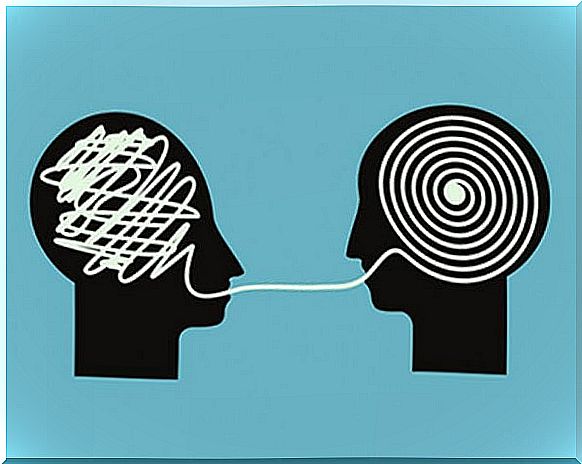Processing Emotions: 7 Techniques To Do It

Processing your emotions correctly means learning to channel everyday stress in a calm and creative way. Even though emotions are part of our lives, let’s not forget that we need to know how to regulate them. In fact, it is the key to a better life full of possibilities.
Neuropsychologists say we have an average of 6,000 thoughts a day. 95% of this is the same as the day before. The number of thoughts from the week before is only slightly smaller.
Learning to think differently and change our attitude towards certain people, ideas, situations or objects is not easy, we know that. That’s because no one is born into this world and immediately knows what emotions are and how we can regulate them.
We are all born crying. That will be our language until someone says ‘now it’s enough’. Someone will tell us that “big kids don’t cry.” And that’s what we do.
We let the years go by. We hold back our anger because they told us not to express it that way. But they never told us how to express it.
Because heroes don’t get scared or angry. So there aren’t many role models for little kids and not-so-little kids. Where do they see a good example of how to process their emotions?
James Gross, director of the psychophysiology lab at Stanford, explains it better. He says that you need to know how to use good techniques for processing your emotions. This is key to preventing illnesses such as depression or borderline personality disorder. So managing our mess of thoughts and negative emotions means health and well-being.

Processing Your Emotions Using These Techniques
There are many techniques for processing your emotions. But before we start the research and run the risk of being overwhelmed by the many approaches, dynamics and proposals the world offers us, we need to be clear about one thing.
There is no universal approach to processing your emotions. We have to make do with our own personal toolbox. Not every tool works the same for everyone.
For example, it often happens that a lot of people start with mindfulness. They hope it will solve most of their life puzzles. But not everyone learns to meditate. Not everyone finds physiological and mental peace in it.
The best and most advisable is to use a multidimensional focus. It is a focus in which the cognitive, physiological and emotional aspects, as well as the behavior, point towards one goal. That goal is well-being, tranquility and better mental focus.
Now let’s look at seven techniques for processing your emotions that have proven to be the most efficient. We recommend that you try them all and see which one works best for you.
1. Situations to Avoid, Situations to Engage
Of course, we cannot regulate everything that happens around us in our daily lives. But there are situations that we do indeed have control over. We can avoid them to improve our well-being.
- Leaving the house on time means, for example, that I have to hurry. This causes me to arrive at work in a bad mood. So I should try to get up earlier so I’m less in a hurry.
- Family dinners on Sundays may make me nervous and put me in tense situations. In this case, it is best to suggest other options. That way I will avoid the situation for the sake of my health.
- There are of course also situations and things that I cannot avoid. For example, I might avoid speaking in front of an audience for work or flying on an airplane. But this will only increase the nervousness within me. Sometimes we have to face our fears in order to overcome them.

2. Turn your attention to something else
My colleague gets more contracts than I get. My neighbor managed to lose more weight before I did. This train is going too fast, we’re going to crash anyway, the newspaper only tells bad news, something bad is definitely going to happen..
All these thoughts make us very stressed. They feed our fear, lower our self-confidence and make us lose control of our lives. We must learn how to change our focus from our immediate environment and its complexity. That way we can direct it inward.
Once we spend some time there, within ourselves, taking care of and listening to ourselves, everything will become balanced again. This is one of the best techniques for processing your emotions.
3. Improve your self-control by looking to the near future
We know that the idea of focusing your attention on the here and now, the present moment, is very popular right now. Okay, let’s propose something else. Think about your near future. Think about tomorrow, or the next week.
- Sometimes our present is completely controlled by fear, stress and frustration.
- Instead, think about what you want in the near future. “I want to feel good, I want to achieve this, I want this to happen and I want to feel more confident about myself.”
- Use the technique of reaffirmation: remember your strengths and your past successes so that you can pin all your hopes on the near future.
4. Mental Note: Save Your Worries for a Specific Time of Day
Nietzsche once said: Thoughts come when they want, not when we want them to come. It’s the same with worry. They are like ravens perching on the power lines of our fears and anxieties. They are there to make them worse, to knock out your optimism and potential and leave you in the dark.
Don’t allow this. Every time a concern pops up in your head ‘inbox’, turn it off. Leave it for later, for a time of day when you are calm and relaxed. Only in moments like these can you reflect on it and find solutions to your problems.

5. Q&A: What’s the Worst That Could Happen?
It happens to all of us. Sometimes we obsess over things and drive ourselves crazy, unable to find a way out.
They are thoughts like ‘they are going to fire me’, ‘my boyfriend doesn’t pay much attention to me anymore’, ‘I will never save enough money to pay off that debt…’. They trap us in a meaningless maze, an exhausting spiral.
Instead of having these thoughts, we better learn how to go a little further. Let us ask ourselves what would happen if what we fear actually happened. But let’s do it the right way and add a solution to it:
- “If they fire me, I’ll finally be able to start that project.”
- “When my boyfriend stops paying so much attention to me, I’ll ask him what’s wrong. If it turns out that our relationship isn’t working anymore, I’ll have to accept it, deal with the pain and move on with my life.’
- “The moment I can’t pay off my debt, I’ll have to sell this or that or ask my family for help.”
6. Meditation as a way to relax body and mind
Meditation is one of the most effective techniques for processing your emotions. But to make this strategy fruitful, we have to practice it often. We won’t see immediate results in the first week and maybe not even in the first month.
But if we practice it regularly, the result will gradually become apparent. The key to this is to be patient and consistent.
7. Find your escape route, your self-expression
There are people for whom writing is a refuge and a way of expressing oneself. Perhaps you draw or paint mandalas as a technique for processing your emotions. Some people go for a run, some need silence or nature. And there are people who prefer to have a cup of coffee with friends, read books, listen to music, walk their dog or look for a precious moment alone.
The best techniques for processing your emotions don’t always come from books. Sometimes we find them independently. Often and when we least expect it, we find that activity that helps us find peace with the world and tranquility within ourselves.
It is a space where we get to know ourselves again to find the roots of our problems. They are havens of tranquility and satisfaction where our courage will find a home.

So let’s find a way to express ourselves and to feel better about ourselves. Let’s devote valuable time to it and apply some of the strategies we’ve listed here for the sake of our health. Every effort we make will be worth it.
Bibliography
Gross, J.J. (2001). Emotion regulation in adulthood: Timing is everything. Current Directions in Psychological Science, 10, 214-219. DOI: 10.1111/1467-8721.00152.
Gross, JJ, & Jazaieri, H. (2014). Emotion, emotion regulation, and psychopathology: An affective science perspective. Clinical Psychological Science.
Goleman, Daniel (1995). Emotional Intelligence. Bantam Books.
Bradberry, Travis. Greaves, Jean (2009). Emotional Intelligence 2.0. Talent Smart.
R. Covey Stephen (1988). The 7 Habits of Highly Effective People. Free Press.









